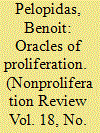|
|
|
Sort Order |
|
|
|
Items / Page
|
|
|
|
|
|
|
| Srl | Item |
| 1 |
ID:
177999


|
|
|
|
|
| Summary/Abstract |
In February 2020, French president Emmanuel Macron invited all interested European states to a “strategic dialogue” on the supposed contribution of France’s nuclear arsenal to European collective security. While certain media commentators relayed Macron’s intervention with approbation and excitement, framing the proposal as an exciting new idea that, if implemented, might boost Europe’s clout on the world stage, the dominant reaction was one of ennui. After all, the argument for Euro-nukes is far from new. In fact, several (mostly French) actors have unsuccessfully attempted to persuade European policymakers of the necessity of European nuclear weapons cooperation for more than half a century. In this article, we investigate the history, merits, and longevity of the case for European nuclear arms. Drawing on secondary literature, policymakers’ writings, and two hitherto untapped surveys of European public opinion conducted by one of the authors, we argue that the case for Euro-nukes is critically flawed with respect to security, strategic autonomy, futurity, and democratic good governance. We maintain that the continuous resurfacing of the “zombie” case for Euro-nukes is made possible by powerful organisational interests, as well as conceptual reversification resulting in enduring contradictions between nuclear vulnerabilities and claims of protection and autonomy.
|
|
|
|
|
|
|
|
|
|
|
|
|
|
|
|
| 2 |
ID:
111596


|
|
|
|
|
| Publication |
2012.
|
| Summary/Abstract |
This article elaborates the notion of 'nuclear idiosyncrasy' as a specific understanding of what nuclear weapons and energy are, what they stand for and what they can do. It then assesses the persistence of nuclear idiosyncrasy over time and its effects on French nuclear policies in the United Arab Emirates (UAE) and Iran. Based on interviews in France, Geneva and the UAE, this article contributes to three debates within foreign policy analysis and nuclear history. Is a regional approach necessary to understand the framing of foreign policies in the twenty-first century? Does a change in leadership fundamentally affect the orientations of nuclear policies? Are the risks of nuclear proliferation in the Middle East and the measures to prevent it similarly understood by all the players in the international community? First, it shows that French nuclear policies in the Middle East are not shaped by dynamics specific to the region as the often invoked notion of an 'Arab policy of France' would suggest. Secondly, in-depth analysis leads one to reject the idea of a major change between the nuclear policies of Presidents Chirac and Sarkozy. Thirdly, persistent French nuclear idiosyncrasy leads also to rejection of the idea of convergence towards a shared understanding of the proliferation threat in the Middle East.
|
|
|
|
|
|
|
|
|
|
|
|
|
|
|
|
| 3 |
ID:
102396


|
|
|
|
|
| Publication |
2011.
|
| Summary/Abstract |
By examining via a case study the political authority of US proliferation experts since the 1960s, this article contributes to nuclear weapons proliferation studies and to the growing literature on the role of expertise in democracies. First, it argues that policy choices are determined by an understanding of history and that approaching nuclear history as a history of nuclear weapons proliferation is a presumption shared by both US experts and policy makers. Second, it shows that this understanding of history, relying on the metaphorical use of the term proliferation (which was imported from biology), strongly distorts the facts. Third, the article shows that nuclear experts are plagued by a conservative bias as a result of this use of the proliferation metaphor. Instead of challenging the faulty proliferation narrative, most experts have backed it without question. Fourth, the legitimacy that experts lend to this view of history has important political effects: it provides an authoritative assessment of past policies and limits the possibility of political innovation. Policy initiatives tend to be restricted to changes in speed or intensity. The article suggests three changes that might restore room for informed political innovation in nuclear weapons policies.
|
|
|
|
|
|
|
|
|
|
|
|
|
|
|
|
|
|
|
|
|